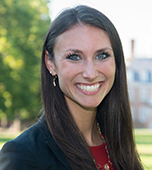Fall 2020, Issue 3, pp. 21–22
[Online 16 Nov. 2020, Article A018]
[PDF]
Addressing Systemic Biases: A Recent Student Perspective on Religion and Public Health
Caitlyn Gudmundsen[1]
-
-
Editors’ Note: The PHRS Bulletin regularly features accounts and reflections from early career professionals in public health about their discovery, training, knowledge, work, and reflections upon spiritual and religious factors in public health.
-
As the daughter of two ordained Baptist ministers, my faith has been at the core of my daily life and identity since birth. My parents instilled in me the value of asking hard questions and studying my faith academically, and it was my religious upbringing that motivated me to pursue a career focused on service.

I found a love and interest for the field of public health during my undergraduate time at the College of William and Mary, and was drawn to holistic, empowering global health interventions. I was later introduced to the idea of “toxic charity” (Lupton, 2011), and began to reflect on my own role in church missions, grappling with the notion that, though well-intentioned, many of my faith-based efforts to help people likely did just the opposite, and reinforced systems of oppression, partly through their disproportionate emphasis on short-term relief rather than systemic improvement and empowerment. This epiphany led to my strong sense of calling to work at the intersection of religion and public health, and help foster connections between those two worlds to achieve better outcomes for those we aim to serve.
I completed a dual Master of Public Health and Master of Divinity at Emory University, and was inspired by the Emory faculty’s commitment to interdisciplinary work. Before arriving at Emory, I had a narrow view of the intersection of religion and public health, but quickly learned it is much more complex and expansive than I could have imagined. My coursework broadened my thinking, and I learned to better speak the languages of both fields, a critical skill for working at the boundary of the disciplines.
While in graduate school at Emory, I had the opportunity to study at St. Paul’s University in Limuru, Kenya. I had an incredible professor at St. Paul’s named Esther Mombo, who is a thought leader on the impact of religion on HIV/AIDS. In many cases, religion has exacerbated the harm of the HIV/AIDS pandemic by shaming people living with the virus. However, religion is also a powerful way to make meaning and begin healing, and many African women theologians hold that the role of the church is to identify suffering in the world, name that suffering, and stand in solidarity with those who suffer. Standing in solidarity sometimes requires recognizing the pain religion has caused, and drawing on the strengths of faith to promote healing.
I am now serving as the Director of Strategic Initiatives at Lutheran Services in America, where I oversee grants that engage health and human service agencies with Lutheran heritage. Like me, the people I work with are motivated by their faith to serve vulnerable populations. The grant programs I oversee require participating agencies to disaggregate their program data by race, and identify gaps in their programming that may exacerbate disparities.
I am finding that since George Floyd’s murder, many faith-based organizations we work with are more motivated than ever to address systemic racism, and the health disparities it creates. I am also learning that well-intentioned antiracist efforts must be self-aware – we must recognize the baggage our faith-based work often carries in communities of color. Applying what I learned in Kenya from African female theologians: it is only when we unpack the historical harm of organized religion on marginalized communities that we can stand in solidarity with those impacted communities, and then draw upon the immense power of faith to foster physical healing, as well as societal healing.
As I seek to address and balance these powerful concerns and historical tensions, my education in public health and theology continues to provide a sturdy foundation.
References
Lupton, R. D. (2011). Toxic charity: How churches and charities hurt those they help (and how to reverse it). New York: HarperCollins.
[1]^ Caitlyn Gudmundsen, MDiv, MPH, is Director of Strategic Initiatives at Lutheran Services in America (caitlyncookfurr@gmail.com).
